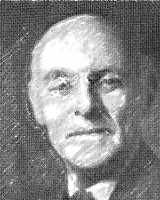The Educational Theory of Abraham Flexner
|
Analyst: Sandra Dunigan |

|
©2000 NewFoundations
The Educational Theory of Abraham Flexner
|
Analyst: Sandra Dunigan |

|
RETURN
5/1/14
I. Theory of Value: What knowledge and skills are worthwhile learning? What are the goals of education?
It is impossible to set aside any definite set of facts or skills as constituting the best training for medicine. Basic skills acquired are of less importance than the habit of inquiry, the ability to use senses, the capacity for well directed effort." A-pg 138
The active exercise of his faculties should store his mind with information and train him in a technique that makes all experience contribute to his growth, and finally equip him with the various practical skills that as a physician and investigator, he will in the future employ." A-pg 178
The maturity, previous training, intellectual competency of the student body determines in advance the scope, quality, methods, aims and outcomes of the instruction offered in medical school." A-pg 59
" Higher education needs to be broad in purpose" A- pg 59
Knowledge is necessary, in that scientific method does not occur in a vacuum." A-pg13
Medicine is a discipline in which the effort is made to use knowledge procured in various ways in order to effect certain practical ends." B-pg 156
Basic knowledge of normal function of the human body- structure, function environment is necessary to understand disease states. A-pg 106
The human body belongs to the animal world. It is put together of tissues and organs in their structure, origin, and development not essentially unlike what biologist is otherwise unfamiliar with; it grows, reproduces itself, and decays. It is liable to attack by hostile physical and biological agencies. The normal course of bodily activity is a matter of observation and experience." B-pg53
Elementary and secondary education should be conceived from the standpoint of the student as a human being not as a future doctor, artist, or engineer." A- pg 59
"An education in medicine nowadays involves both learning and learning how-- the student cannot effectively know unless he knows how." B- pg 53
Medical knowledge cannot be passively learned but rather involves the mental process of observation, sorting, combining, inferring, and trying. A-pg 13
Effectively learning is not merely a question of the particular methods employed by the teacher; it is far more a question of the attitude and activity of the student. Strictly speaking, men are as I have already urged, self-taught. A-pg 183
The inductive technique will be acquired in the process of learning."
A-pg 13
"Teachers of modern medicine clinical as well as scientific must be men of active, progressive temper, with definite ideas, exciting habits in thought and work and with still some margin for growth. Their practical success depends, therefore on their ability to carry into routine the rigor and vigor of their research moments." B-pg 56
Medical school curriculum should challenge the students ability to work toward a deferred end.... therefore constructed on a logical rather than a natural basis." A-pg 113
On the pedagogical side, modern medicine like all scientific teaching is characterized by activity. The student no longer merely watches, listens and memorizes; he does ."B-pg53
The didactic lecture being pedagogically sound only at relatively late stages of student discipline." B-pg98
Upon him (the physician) society relies to ascertain, and through measures essentially educational to enforce, the conditions that prevent disease and make positively for physical and moral well-being" B-pg26
On his own skills, knowledge, and resourcefulness The welfare of his patients altogether depends." B-pg44
The medical profession is a social organ, created not for the purpose of gratifying the inclination and preferences of certain individuals, but as a means of promoting health, physical vigor, happiness-- and economic independence and efficiency immediately connected with these factors." B-pg42
As far as possible into adolescence, all children are assuredly entitled to the untrammeled development of their faculties in order that they may participate in the enjoyment of the cultural heritage of humanity." A-pg59
Higher education needs to be easily accessible and if it is to be really efficient open on the basis of ability and earnestness. A serious and general social loss is also incurred if superior opportunities are lavished upon the stupid or indolent, for no better reason than they are the right sort." A-pg59
Between men of first-rate ability, collaboration or teamwork cannot be arranged or forced; on the other hand, collaboration and discussion will take place where relatively small groups of scholars have abundant opportunity to discuss with one another either their own individual problems or problems that lie on the borderline." C-pg242
Cooperation and contracts are important: it is for this reason that I have urged unification within a university- administrative, social, and local. A-pg273
References:
A. Flexner, A. (1925). Medical Education: A Comparative Study. New York: Macmillan Company.
B. Flexner, A. (1910, revised 1973). Medical Education in the United States & Canada. New York: Heritage Press.
C. Flexner, A. (1960). Abraham Flexner: An Autobiography. New York: Simon Schuster.